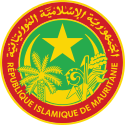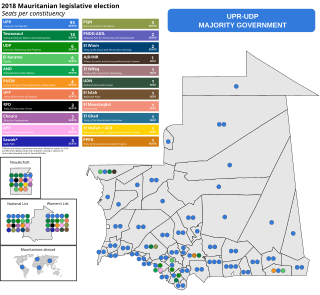 |
|---|
|
Territorial Assembly elections were held in Mauritania on 30 March 1952. [1] The result was a victory for the Mauritanian Progressive Union, which won 22 of the 24 seats. [2]
 |
|---|
|
Territorial Assembly elections were held in Mauritania on 30 March 1952. [1] The result was a victory for the Mauritanian Progressive Union, which won 22 of the 24 seats. [2]
The Territorial Assembly was elected by two colleges; the first college elected 8 members and the second 16. [3]
| Party | First College | Second College | Total seats | |||||
|---|---|---|---|---|---|---|---|---|
| Votes | % | Seats | Votes | % | Seats | |||
| Mauritanian Progressive Union | 31,644 | – | 12 | 12 | ||||
| Mauritanian Entente | 10,937 | – | 1 | 1 | ||||
| Union for the Defence of Mauritania and the French Union | 277 | 5 | 5 | |||||
| French Union | 183 | 3 | 3 | |||||
| Other parties | 0 | 0 | 0 | |||||
| Independents | 5,697 | – | 3 | 3 | ||||
| Total | 8 | 16 | 24 | |||||
| Total votes | 647 | – | 61,597 | – | ||||
| Registered voters/turnout | 1,020 | 63.43 | 130,441 | 47.22 | ||||
| Source: De Benoist [1] | ||||||||

French West Africa was a federation of eight French colonial territories in West Africa: Mauritania, Senegal, French Sudan, French Guinea, Ivory Coast, Upper Volta, Dahomey and Niger. The federation existed from 1895 until 1958. Its capital was Saint-Louis in Senegal until 1902, and then Dakar until the federation's collapse in 1960.

Moktar Ould Daddah was a Mauritanian politician who served as the country's first President after it gained its independence from France. Moktar served as the country's first Prime Minister from 1957 to 1961 and as its first President of Mauritania, a position he held for 28 years until he was deposed in a military coup d'etat in 1978.

Elections in Mauritania encompass four different types: presidential elections, parliamentary elections, regional elections and local elections.
This electoral calendar 2007 lists the national/federal direct elections held in 2007 in the de jure and de facto sovereign states and their dependent territories. Referendums are included, although they are not elections. By-elections are not included.

The National Assembly is the unicameral legislative house of the Parliament of Mauritania. The legislature currently has 176 deputies, elected for five-year terms in electoral districts or nationwide proportional lists.

The Mauritanian Parliament is composed of a single chamber, the National Assembly. Composed of 176 members, representatives are elected for a five-year term in single-seat constituencies.

The current Constitution of Mauritania was adopted on 12 July 1991. There have been several constitutions since Mauritania's independence in 1960.

The period from the mid-nineteenth to mid-twentieth centuries is the colonial period in Mauritania.

Mauritania, formally the Islamic Republic of Mauritania, is a sovereign country in Northwest Africa. It is bordered by the Atlantic Ocean to the west, Western Sahara to the north and northwest, Algeria to the northeast, Mali to the east and southeast, and Senegal to the southwest. By land area Mauritania is the 11th-largest country in Africa and 28th-largest in the world; 90% of its territory is in the Sahara. Most of its population of some 4.3 million lives in the temperate south of the country, with roughly a third concentrated in the capital and largest city, Nouakchott, on the Atlantic coast.

The Colony of Niger was a French colonial possession covering much of the territory of the modern West African state of Niger, as well as portions of Mali, Burkina Faso and Chad. It existed in various forms from 1900 to 1960 but was titled the Colonie du Niger only from 1922 to 1960.

Elections for the Territorial Assembly were held in French Dahomey on 30 March 1952. Sourou-Migan Apithy's Republican Party of Dahomey won 19 of the 32 second college seats. Only ten members of the Legislative Council elected in 1947 were re-elected.

Parliamentary elections were held in Mauritania on 17 May 1959. The result was a victory for the Mauritanian Regroupment Party, which was the only party to contest the elections, thereby winning all 40 seats in the National Assembly. Voter turnout was 90.3%.

Presidential elections were held for the first time in Mauritania on 20 August 1961 to elect the president for the next five years. Moktar Ould Daddah, who had been acting head of state since independence from France in 1960 was the only candidate, and was elected unopposed. Although he was a member of the ruling Mauritanian Regroupment Party, his candidacy was also supported by the Mauritanian National Union. Voter turnout was 94%.

Elections to the French National Assembly were held in Mauritania on 17 June 1951. Mauritania had one seat in the Assembly, which was won by Sidi el-Mokhtar N'Diaye, a member of the Mauritanian Progressive Union. He defeated the incumbent, Horma Ould Babana, who had been elected as a member of the French Section of the Workers' International in the last election, but had since gone on to leave the SFIO and form his own party, the Mauritanian Entente.

The Mauritanian Progressive Union was a political party in pre-independence Mauritania.

Territorial Assembly elections were held in Niger on 30 March 1952. The Union of Nigerien Independents and Sympathisers won 34 of the 35 seats in the Second College.

Parliamentary elections were held in Mauritania in September 2018; the first round took place on 1 September, with a second round held on 15 September. At the national level, elections were held in 157 constituencies, each electing one member to the National Assembly. Elections were also held in 13 regional councils and 219 municipalities.

L'Malouma Saïd is a Mauritanian anti-slavery activist, deputy to the Mauritanian National Assembly.

Mohamed Ould Cheikh Mohamed Ahmed Ould Ghazouani, also known as Ghazouani and Ould Ghazouani, is a Mauritanian politician and retired army general who has been the 9th President of Mauritania since 2019, and the chairperson of the African Union since February 2024.

Mauritania is divided into several electoral districts for the election of deputies to the National Assembly, based on the departments of the country, with the exception of the capital city of Nouakchott, where the electoral districts are based on the three regions the city is divided in.